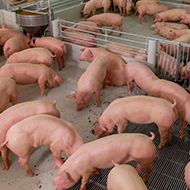Calls for greater support for the pig sector

The NPA says that 2021 has been the perfect storm for the pig sector.
The UK pig sector has reiterated its call to the Government for support as it continues to respond to a backlog on farms, together with increased production costs and falling prices.
The National Pig Association says the backlog is still causing major problems for some farmers ‘who have run out of options and the financial situation is dire.’ It comes amid growing pressure on the pig sector caused by staff shortages linked to Brexit and COVID-19.
In his New Year message, NPA chairman Rob Mutimer sets out his hopes for 2022, ‘after the turmoil of 2021’:
“2021 really has been the perfect storm for the pig sector,” he said. “COVID-19 was initially quite friendly to the industry, but the bite in the tail of the loss of Chinese exports and illness and staff shortages reducing the throughput of the processing sector has really hurt us.
“With this being further compounded by Brexit, increased production costs and drop in the pig price, the industry has had a great deal to cope with over the past 12 months. A serious backlog of pigs remains on farms, which is still causing huge problems for some farmers who have run out of options, and the financial situation is dire.”
Regardless of this, Mr Mutimer adds that the sector is starting to see the first chinks of light for recovery’, such as renewed access to the Chinese pork market, which is seeing some strong growth in prices in the third quarter of 2021.
He also said that sales of retail pig meat have been strong following COVID-19 and that farmers should be confident of this.
As the sector moves into a new year, Mr Mutimer stressed that the Government must ‘fix the broken supply chain, so that all parts of it are sharing the burden during these difficult times’.
He added: "Producers want fairness in their dealings with processors and, while we appreciate the efforts of those retailers who have been backing British pork, we need to see all retailers prioritising our fantastic British product over cheap imports.
“As we seek recovery and a brighter future for our sector, we will also need the full backing of the Government in ensuring any support it delivers achieves its aim of reducing the backlog, rather than simply benefiting processors. We welcome indications the Government is planning to look further into the pork supply chain, which does need to be held to account."



 The Animal and Plant Health Agency (APHA) has updated its online reporting service for dead wild birds.
The Animal and Plant Health Agency (APHA) has updated its online reporting service for dead wild birds.